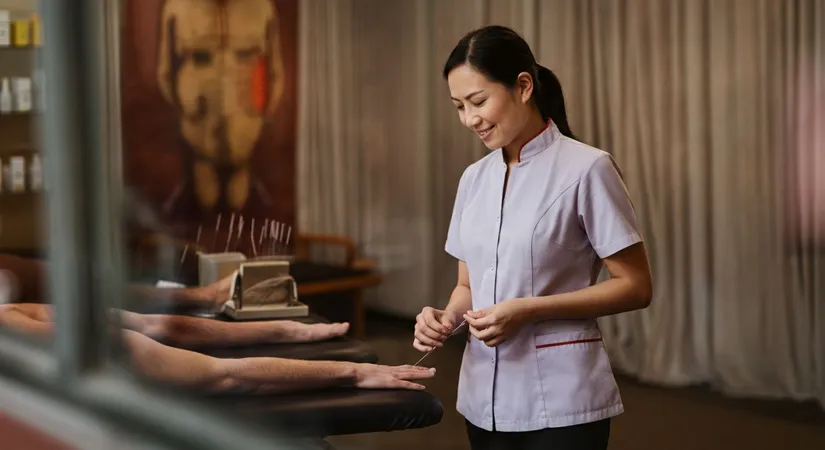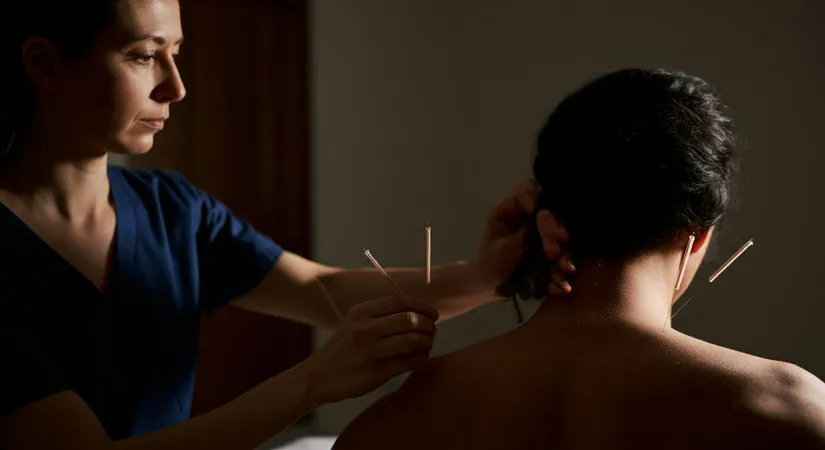Find the Best Acupuncturist Near Me for Effective Back Pain Relief
Find the best acupuncturists near you for effective holistic healing and anxiety relief. Book today for a healthier tomorrow.
Introduction
In the quest for holistic healing, acupuncture stands out as a leading traditional medicine technique. This therapy offers relief from various conditions, notably anxiety, by leveraging ancient Chinese medicinal practices. Delving into acupuncture can uncover a world of benefits that support mental and physical well-being.
Understanding How Acupuncture Therapy Works for Anxiety Relief
The Role of Acupuncture in Balancing Energy
Acupuncture therapy is a cornerstone of traditional Chinese medicine, focusing on the balance of energy, or Qi, within the body. By inserting fine needles at specific acupoints, practitioners aim to enhance the flow of energy, which is believed to alleviate anxiety symptoms. This method is particularly effective in reducing stress hormones, thereby promoting relaxation and mental calmness.
Key Benefits of Acupuncture for Anxiety
- Reduces stress hormones, leading to a calmer mental state.
- Enhances overall energy flow, contributing to emotional balance.
- Promotes relaxation through the stimulation of over 1100 acupoints.
Steps in an Acupuncture Session for Anxiety Relief
- Initial consultation to assess anxiety levels and energy imbalances.
- Insertion of fine needles at targeted acupoints to stimulate energy flow.
- Post-session evaluation to monitor changes in anxiety symptoms.

Exploring Traditional Chinese Medicine and Its Benefits
Holistic Healing Through Traditional Chinese Medicine
Traditional Chinese Medicine (TCM) offers a holistic approach to health, integrating physical, mental, and spiritual well-being. It emphasizes the balance of Yin and Yang, vital forces that influence health. This balance is crucial for preventing and treating illnesses.
TCM includes various practices such as herbal medicine, acupuncture, and Tai Chi. These methods aim to restore harmony within the body, addressing the root causes of ailments rather than just symptoms. For instance, acupuncture therapy is renowned for its ability to alleviate chronic pain and improve overall energy flow.
Core Components of Traditional Chinese Medicine
- Herbal Medicine: Utilizes natural herbs to treat various conditions, enhancing bodily functions.
- Acupuncture: Involves needle therapy to stimulate specific points, promoting energy balance.
- Qi Gong and Tai Chi: Physical exercises that improve flexibility, strength, and mental clarity.
Steps to Achieve Balance with TCM
- Initial assessment to understand individual health needs and imbalances.
- Customized treatment plan incorporating acupuncture, herbs, and lifestyle changes.
- Regular follow-ups to adjust treatments and ensure sustained health improvements.

Finding Affordable Acupuncture Sessions Near Me
Exploring Cost-Effective Acupuncture Options
As acupuncture therapy gains popularity, finding affordable sessions has become more accessible. Many acupuncture clinics now offer flexible treatment plans that cater to individual health needs and financial constraints. These plans often include initial consultations to assess specific health goals and tailor treatments accordingly.
For example, some clinics provide sliding scale fees based on income, making acupuncture therapy more accessible to a broader audience. Additionally, community acupuncture sessions, where treatments are conducted in a group setting, can significantly reduce costs while still delivering effective results.
Benefits of Affordable Acupuncture Services
- Increased accessibility to holistic healing methods for diverse populations.
- Opportunity to explore traditional Chinese medicine without financial strain.
- Enhanced community support through shared healing experiences.
Steps to Find Affordable Acupuncture Near You
- Research local acupuncture clinics and their pricing structures.
- Inquire about sliding scale fees or community acupuncture sessions.
- Schedule an initial consultation to discuss personalized treatment plans.
Is Acupuncture Safe? What You Need to Know
Ensuring Safety in Acupuncture Practices
Acupuncture therapy, a key component of traditional Chinese medicine, is generally considered safe when performed by certified professionals. The procedure involves inserting fine needles into specific points on the body to promote healing and balance. While it is minimally invasive, ensuring safety is paramount.
One crucial aspect of safety in acupuncture is the use of sterilized needles. Practitioners must adhere to strict hygiene protocols to prevent infections and ensure patient safety. Additionally, understanding the anatomy and physiology of the human body is essential for acupuncturists to avoid any potential complications.
Common Side Effects and Precautions
- Slight bruising or soreness at needle insertion sites is common but usually temporary.
- Patients should inform practitioners of any medical conditions to tailor treatments safely.
- Choosing a licensed acupuncturist ensures adherence to safety standards and protocols.
Steps to Enhance Acupuncture Safety
- Verify the acupuncturist's credentials and ensure they are certified by a recognized board.
- Discuss any health concerns or conditions with the practitioner before starting treatment.
- Ensure the use of single-use, disposable needles to maintain hygiene and prevent infections.
Acupuncture Therapy: Balancing Energy for Anxiety Relief
Ensuring Safety in Acupuncture Practices
Frequently Asked Questions
How does acupuncture work for anxiety relief?
Is acupuncture safe?
What are the benefits of traditional Chinese medicine?
How often should you get acupuncture for anxiety?
What should I expect during an acupuncture session for anxiety?
Discover the path to 'Healthy Beauty' with estethica's expert care. Call now for your free consultation and take the first step towards a more confident you!
📞 Call for Your Free Consultation